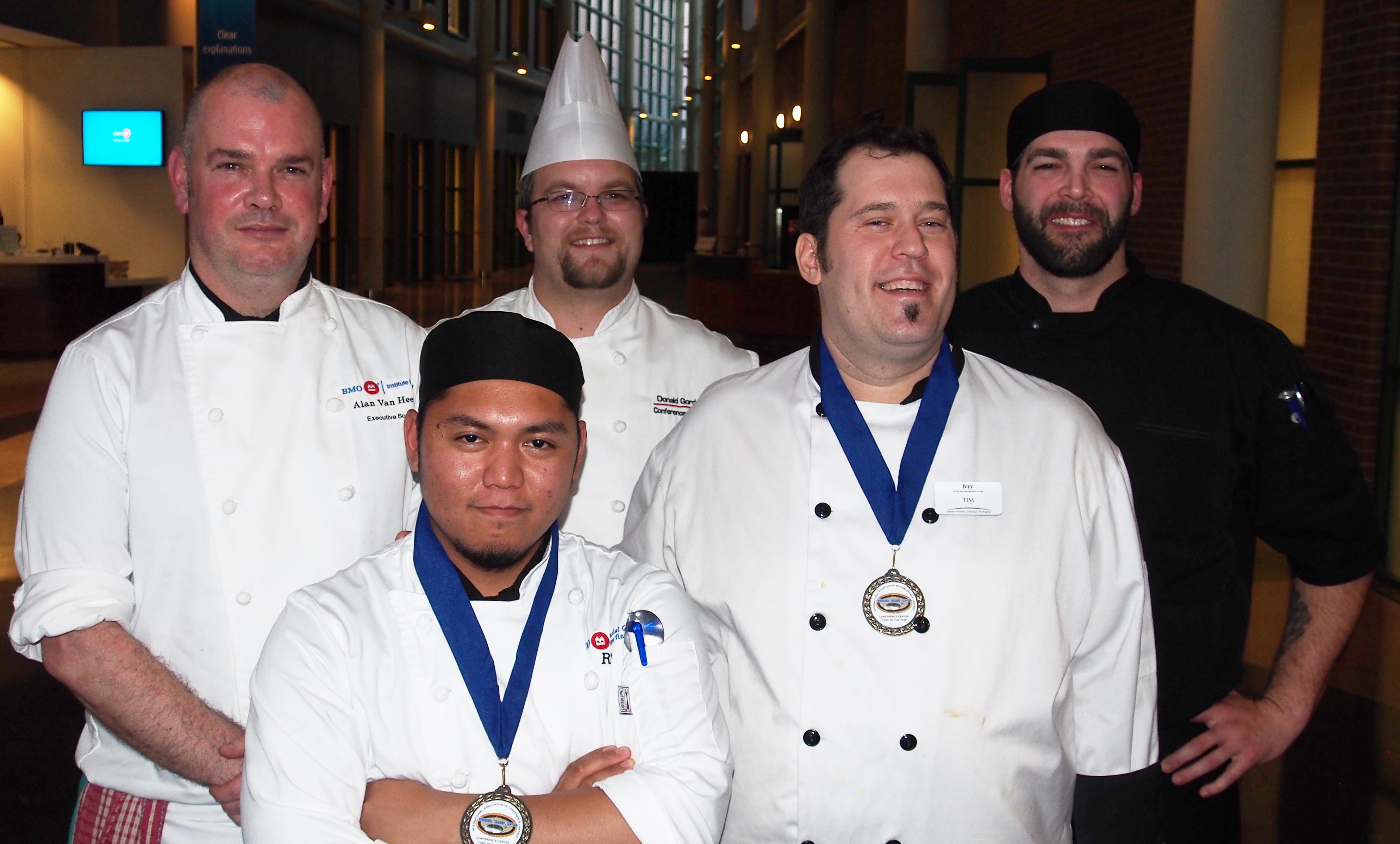Copper Skillet Competition Hones Culinary Skills
Recently, I was asked to judge the Canadian round for this year’s Copper Skillet Competition hosted by the International Association of Conference Centers (IACC). Held at the BMO Institute for Learning (IFL) in Markham, Ontario, the contest pitted five top chefs employed by IACC against each other for the chance to represent the country in the North American finals.
Just north of Toronto proper, the sprawling IFL campus houses a mid-sized corporate hotel in a squat brick building enclosing a groomed quad (operated by Dolce Hotels & Resorts) as well as an expansive, fully-loaded conference building. Within minutes of arriving, however, myself and the other judge – none other than acclaimed food writer, Rose Reisman – are ushered into a crowded industrial kitchen by last year’s champ, Chef Murray Hall, where the five contenders are already mentally preparing for the feat ahead.
Those five in alphabetical order are:
- Rexy Barit, Baker, BMO Institute for Learning
- Rick Doucett, Sous Chef, Donald Gordon Centre
- Tim Lentz, Sous Chef, Ivey Spencer Leadership Centre
- Luc McCabe, Executive Chef, NAV Centre
- Alan Van Heerden, Executive Sous Chef, BMO Institute for Learning
The rules for the Copper Skillet were simple. Each chef was given access to a basic assortment of oils, herbs, spices and marinades as well as two gasoline ranges for all cooking needs (hence the name). Once the proteins were unveiled – this year including a fresh snapper, two sirloin medallion steaks and an inch-thick slab of pork belly – the five participants had ten minutes to plan their recipes and organize their ingredients prior to a thirty minute culinary showdown.
Once the opening bell rang, it was a half-hour rush of chopping, slicing, pouring, frying, sizzling, splashing and some of the best smells to ever reach one’s nose. Normally the judges take a backseat during this pandemonium, but taste and creative presentation, although still important, weren’t the only two criteria – cleanliness of work area and practicality for repetition en masse representing the other two chief components for hospitality purposes.
So there I am, pressed against a bare concrete wall and less than a foot away from two frenzied chefs, one rushing to fillet the snapper while the other melts a whole slab of butter into a pan. The other three are immediately behind them, all of them dashing and splashing ingredients about to finish their dishes as the clock ticks down. My only protection: the clipboard graciously given to me by Chef Hall for note taking. Why I wore a suit that day, I still don’t know.
After the thirty-minute marker, Rose Reisman and I convened in the adjacent dining hall where five exquisitely prepared plates were laid before up for us to sample, taste and discuss. Given identical starting ingredients, each artist unsurprisingly conjured up something completely different, both in presentation and overall flavor. After a grueling period of eating some of the best food this side of the Atlantic, we inevitably arrived at a winner – Chef Lentz, with Chef Barit selected to compete in the finals as a junior. Congratulations to all who competed.
Aside from the onslaught of valuable kitchen tips, what was most interesting from that day was the powwow I had with the chefs afterwards over a round of beers. In it, our conversation winded its way to the topic of executive chefs as a point of differentiation for hotels via acclaimed in-house restaurants. We surmised that nowadays hotels must advertise their brands in ever-creative ways in order to reach the consumer’s ear, and one excellent means to this end is by enfranchising a property’s chef so he or she becomes an onsite celebrity.
Why food you ask? As I repeated say, “Everybody eats!” Yes, it’s great to have a championship-level golf course, a world-class spa or a 40-stories-high rooftop pool, but these are only accessible to a fraction of the populace. But, on the other hand, everyone you know likes to eat, cook, dine and socialize over a meal or snack. Exceptional food hits us at our emotional core, and an exceptional dining experience will ensure that patrons remember your hotel’s name and pass the word along. In this way, a great restaurant suggests a great hotel.
Undoubtedly, culinary competitions are a surefire path for chefs to reach prominence. Just ask Tony Fernandes of the Crowne Plaza Toronto Airport who recently returned from the Villeroy and Boch Culinary World Cup in Luxembourg who helped win team gold for the Golden Horseshoe culinary team. Additionally, Chef Fernandes’s garde manger chef, Chaminda Palihawadana, took home silver in the culinary artistry category. Now there’s a feat the hotel should brag about.
While I would encourage you to cajole your kitchen to enter regional, national and international cooking challenges like these, what will get them to the ‘competition ready’ stage will be the freedom you allow them in the kitchen to explore their craft. Embrace artistic dessert presentations. Empower your F&B team to source more demanding protein choices. Encourage boldness in flavor and consummate innovation.
Make your executive chefs into celebrities. Give them a spotlight on the website. Grant them access to your Facebook fan page so they can post pictures of their culinary experiments. Get them tweeting. Make an Instagram or Pinterest account on their behalf. Let them be more than just cooks; let them explore the art of food. Only then will a property’s restaurant truly stand out in customers’ minds and only then will it become a noteworthy point of differentiation to help drive your hotel to the next level.
(Article by Larry Mogelonsky, published in the January 2015 edition of Canadian Lodging News)




